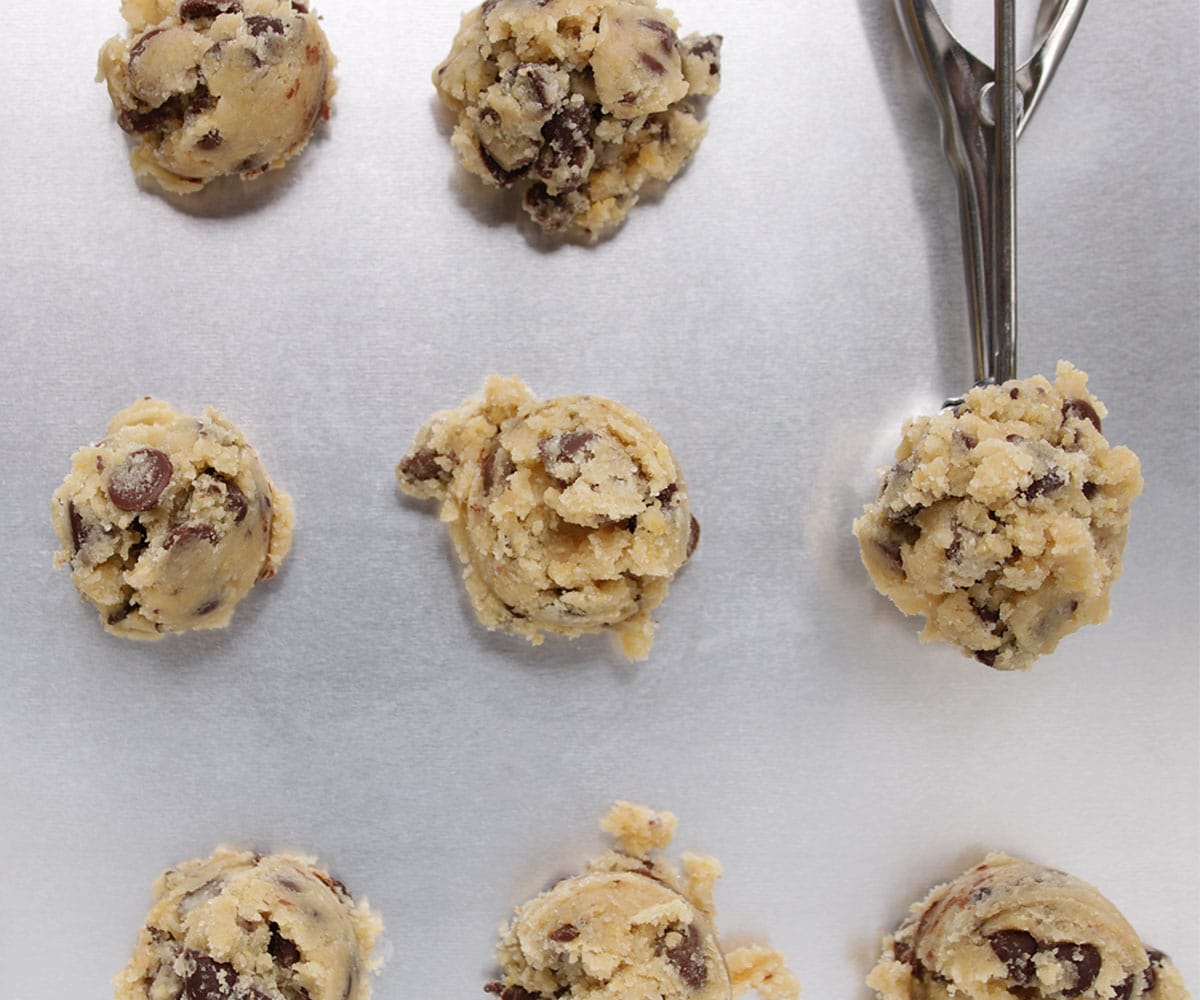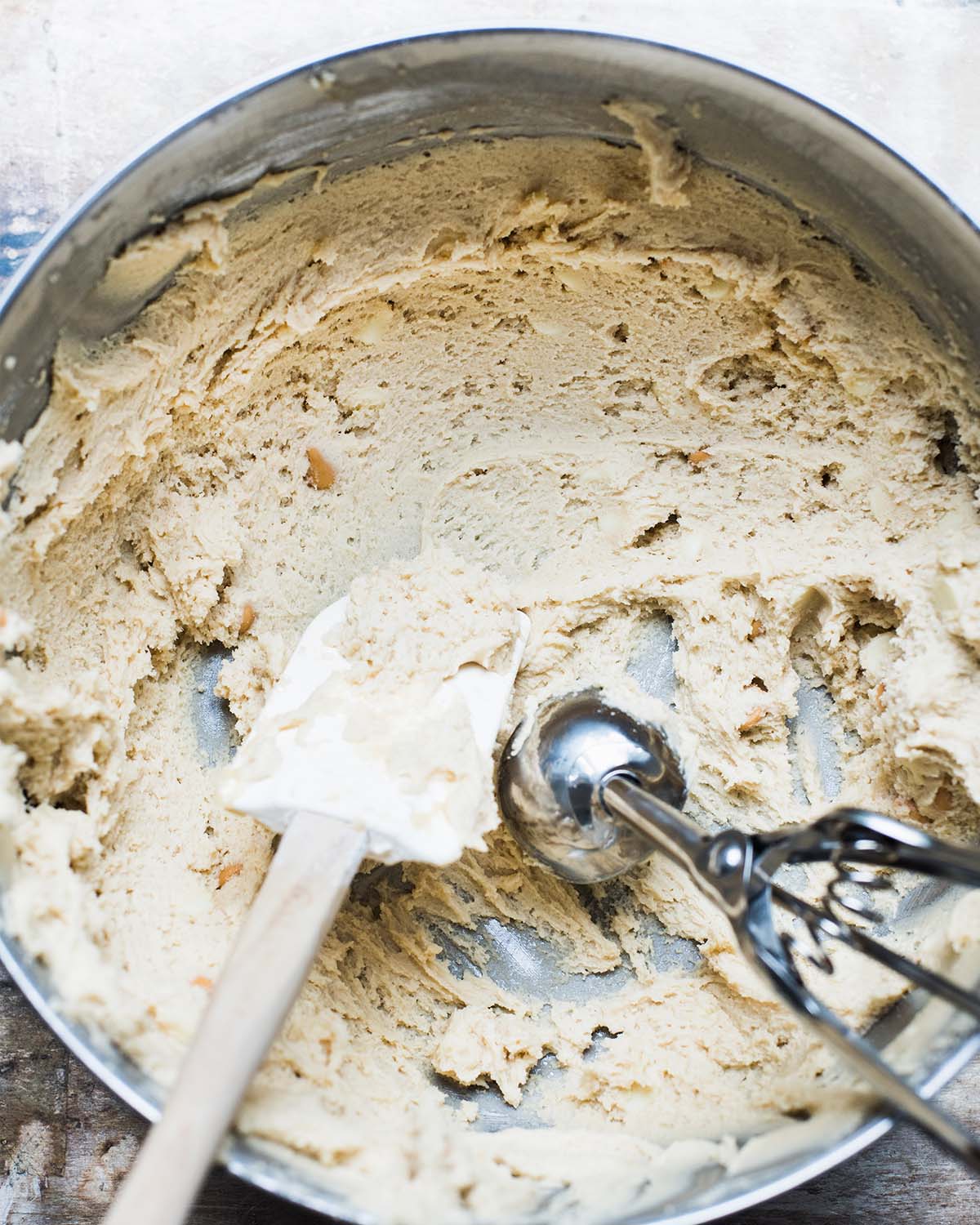No one can resist the deliciousness of freshly made cookie dough. It's soft, it's chewy, and it's irresistible. How long will cookie dough sit out at room temperature before it goes bad? Can you keep cookie dough in the fridge for a few days, or is it better to freeze it?
Cookie dough can go bad quickly if it is not stored correctly. The shelf life of cookie dough depends on various factors, such as the type of ingredients used, how the dough is stored, and even the weather.
Jump to:

What is cookie dough?
Cookie dough is a delightful mixture of flour, sugar, butter, and eggs that you can enjoy in various ways. It can be baked into cookies or used to create other desserts like cake pops or ice cream sundaes. Mixing the ingredients yields a soft dough that can be baked into cookies or eaten raw.
You can flavor it with chocolate chips, nuts, raisins, or other desired ingredients. Cookie dough also makes a great snack on its own. There are many variations of this classic recipe, so you can mix and match your favorite flavors. The possibilities are endless!
You can store the dough in the fridge for up to two weeks or in the freezer for three months. Homemade cookie dough is a popular snack among children and adults alike.
Fun Fact: Did you know that nearly half of all Americans eat cookies daily? The average person consumes about 66 cookies a year. And what's America's favorite cookie? The chocolate chip cookie, of course!
How long can cookie dough sit out?
Recipes for cookies are readily available, and the dough can be made and frozen ahead of time. But how long can cookie dough sit out at room temperature before it goes bad?
The answer to this question depends on a few factors. For example, if the dough contains eggs, it needs to be refrigerated because eggs can spoil quickly at room temperature. However, most cookie dough recipes don't have eggs, so the dough can usually be left out for two hours without going bad. Just make sure to keep it in an airtight container if you're not going to bake it right away.
Interesting reads:
Why can't it sit for too long at room temperature?
The answer has to do with the ingredients in cookie dough. Egg-based cookie dough contains raw eggs, which can harbor bacteria like salmonella.
Uncooked flour is another ingredient that can go bad if it sits at room temperature for too long. Bacteria love flour, and they can multiply quickly if the flour is warm and moist.
Cookie dough that doesn't contain eggs can last at room temperature for a few days, but it's still best to refrigerate it if you're not baking it right away.
Is it safe to eat if we leave it at room temperature?
It is not safe to eat cookie dough that has been left out at room temperature for more than two hours. The eggs in the dough can start to spoil, and the dough can become a breeding ground for bacteria. If you want to eat cookie dough sitting out, it's best to heat it first to kill any harmful bacteria.
How long can cookie dough last in the fridge?
According to The Food Keeper from the Food Marketing Institute, whether opened or unopened, commercially prepared cookie dough should be stored in the refrigerator and used within the expiration date indicated on the packaging. To assure quality, freeze for at least two months.
For best results, store homemade cookie dough in the refrigerator for two to four days or freeze it for two months. You can freeze small quantities of dough and then thaw it in the fridge when required.
For Egg-based cookie dough
Egg-based cookie dough will last for two to four days in the fridge because the eggs act as a preservative and prevent the dough from going bad. The dough will also last longer if it is stored in an airtight container.
For Egg-free cookie dough
Egg-free cookie dough has a shelf life of three months in the refrigerator. As there are no perishable ingredients, these won't spoil as fast. The dough will last longer if kept in an airtight container.

How long can cookie dough last in the freezer?
Cookie dough can last in the freezer for up to three months. This makes it an excellent option for those who want to have cookies on hand but don't want to bake them every time they get a craving. Thaw the dough overnight in the fridge if you're ready to bake.
Listed below are a couple of tips for freezing cookie dough. With these tips, you can preserve your dough for months to come.
1 Use an airtight container.
To protect the dough from drying out, you should keep it in an airtight container. Tupperware or a plastic bag with a tight-fitting lid will do the trick.
2 Label the container.
Be sure to include the date when you prepared the dough. You can keep track of this by writing down how long it has been in the freezer.
3 Only freeze the dough once.
Do not freeze the dough more than once. If you thaw the dough and then freeze it again, it will affect the quality of the dough.
Can cookie dough go bad?
The answer is yes. The main reason for this is because it contains eggs. If the dough is egg-based, it can start to spoil after just two hours. The egg-free dough will last longer but will go bad after four hours. To keep cookie dough fresh, place it in the refrigerator or freezer. This can extend the dough's shelf life to two weeks or three months.

Why is Egg-based cookie dough easily spoiled?
Due to the perishable nature of eggs, egg-based cookie dough is susceptible to spoilage. When the eggs are mixed with the other ingredients, they may begin to go off.
Why is Egg-free cookie dough can go bad?
Eggless cookie dough is not perishable, but it can still spoil. Because milk and butter are present in the dough, these ingredients can spoil if not stored properly.
Can cookie dough be eaten raw?
Since raw cookie dough often contains raw eggs, eating raw dough can be risky. The bacteria salmonella can cause food poisoning if eggs are contaminated. It has other ingredients, such as raw flour, which may be contaminated with E Coli, another type of bacteria that can cause food poisoning.
If you're worried about getting sick from eating raw cookie dough, you can do a few things to make it safer. Use pasteurized eggs or egg whites and heat-treated flour. You can find both of these ingredients at most grocery stores. With these precautions, you can enjoy raw cookie dough without worry!
What does adding an egg to cookie dough do?
Eggs are used in the cookie dough to help bind the ingredients together and add moisture. They also give cookies a softer texture. While eggs are a key ingredient in some cookie dough recipes, they're unnecessary. There are plenty of egg-free cookie dough recipes that are just as delicious - and safe to eat!
How can I make cookie dough safe to eat?
The safest way to make cookie dough is to use pasteurized eggs. The pasteurization process destroys salmonella naturally. You can also use egg substitutes, such as powdered eggs. Click here for a recipe to turn raw cookie dough into edible treats.
Can I eat raw cookie dough if it doesn't have eggs?
Egg-free cookie dough is safe to eat because it doesn't contain raw eggs. Yes, you can eat raw cookie dough if it doesn't have eggs. However, you must be careful not to overeat it, as it contains raw flour, which can make you ill. Check the recipe here.
Can you eat refrigerated raw cookie dough?
The U.S. Food and Drug Administration (FDA) warns against the consumption of raw cookie dough due to the risk of contracting food-borne illnesses such as Salmonella and E. coli.
Raw cookie dough typically contains flour, sugar, eggs, butter, and leavening agents such as baking powder and baking soda. When these ingredients are combined and then refrigerated, they can form bacteria that can cause food poisoning.
While it is technically safe to eat cooked dough that contains raw eggs, there is a risk of Salmonella poisoning if the eggs are not cooked properly. For this reason, it is best to avoid eating raw cookie dough altogether. If you have already refrigerated your dough, you can cook it at a high temperature to kill any bacteria that may be present.
The health risks of eating raw cookie dough
It is common for people to enjoy eating raw cookie dough, but some are worried about the health risks. Raw eggs can contain harmful bacteria, such as salmonella, which can cause food poisoning. If you are concerned about the risks, you can simply bake the cookies. The baking process will destroy any harmful bacteria present.
Food poisoning or Salmonella infection.
Raw cookie dough is the most common cause of food poisoning. Raw eggs can harbor harmful bacteria, such as salmonella. However, it is unlikely that the egg-free dough will cause food poisoning.
Contains raw flour.
The raw flour in cookie dough can also be a health hazard. The flour is not heat-sterilized like eggs, which can be used to reduce bacterial contamination. Cooking typically kills any bacteria living in flour (Source).
In other words, raw flour can cause you to get sick if it's tainted with harmful bacteria like E. coli (Source, Source).
You must heat-sterilize raw flour at home before consuming it without cooking. It can be done by sprinkling flour on a cookie sheet and bake it for five minutes at 350°F (175°C) or until it reaches 160°F (70°C).
Storing cookie dough to make it last longer
Because raw eggs are in cookie dough, it deteriorates quickly. The dough needs to be stored in the refrigerator or freezer to prevent this from happening. The dough, in this way, can be shelf-stable for two weeks or three months.
Store in the fridge.
Wrapping your cookie dough in cling film will prevent it from drying out in the fridge if you decide to store it there. Next, place the dough in a container and keep it in the refrigerator for two weeks.
Store in the freezer.
Cling film should be used to wrap your cookie dough before storing it in the freezer. That way, it won't dry out. Afterward, put the dough in a freezer-safe container and keep it there for three months.
Freezing is a great way to extend its shelf life. When you freeze cookie dough, the water crystals in the ingredients expand, which kills any bacteria or mold that may be present. This process also prevents the growth of new bacteria or mold, so your dough will stay safe to eat for much longer.
Can you refreeze cookie dough?
It's best to freeze things only once and then use them after defrosting. I would not freeze it again personally. You may make the cookies and then freeze them after they've cooled. This one is acceptable.
Frozen food degrades rapidly after being defrosted; this would result in a lack of texture and quality of the food the next time you eat it. Your best option would be to bake the whole batch of thawed dough, and then if it is too many for immediate use, freeze the already baked cookies. This works well.
1. I prefer scooping out small dough balls rather than freezing a large chunk of cookie dough. I freeze the dough balls (not touching) on a cookie sheet once I have gathered all the ingredients needed to make cookies.
2 Once they are completely frozen, I put the dough balls in a gallon-size zip-lock freezer bag. Even better is that I can remove as many or as few brownies as I like, leaving the rest frozen until I'm ready to eat them.
3 Take the amount you want, lay it on a baking sheet, and cook as directed.
How to thaw the frozen cookie dough?
There are a few reasons why you should thaw frozen cookie dough. First of all, it will taste better if you bake it fresh. Secondly, thawed cookie dough is easier to work with than frozen dough. Finally, the thawed dough will rise more evenly in the oven, resulting in uniformly cooked cookies.
You can use any of the following methods to unfreeze the cookie dough.
1 Thaw at room temperature.
You should wrap the dough in cling film if you're going to let it sit at room temperature. This will aid in preventing the dough from drying out. After that, put the dough on a plate and leave it out at room temperature for a few hours.
2 Thaw in the fridge overnight
If you want to defrost your dough in the fridge, wrap it in cling film first. The dough will stay fresh longer this way. Place the dough in an airtight container and thaw overnight in the fridge.
3 Use the microwave to unfreeze
You can microwave the cookie dough to thaw it if you're in a hurry. Place the dough on a plate and microwave for 10-20 seconds intervals until it turns pliable. Be careful not to overcook the dough, as it will become tough.
Bottom line
The six tips we've provided should help you store your cookie dough to last longer. By following these tips, you can extend the shelf life of the dough to two weeks or three months. We've also provided information on avoiding the risk of food poisoning when eating raw cookie dough. Finally, we've answered whether or not it's safe to leave cookie dough out at room temperature.




